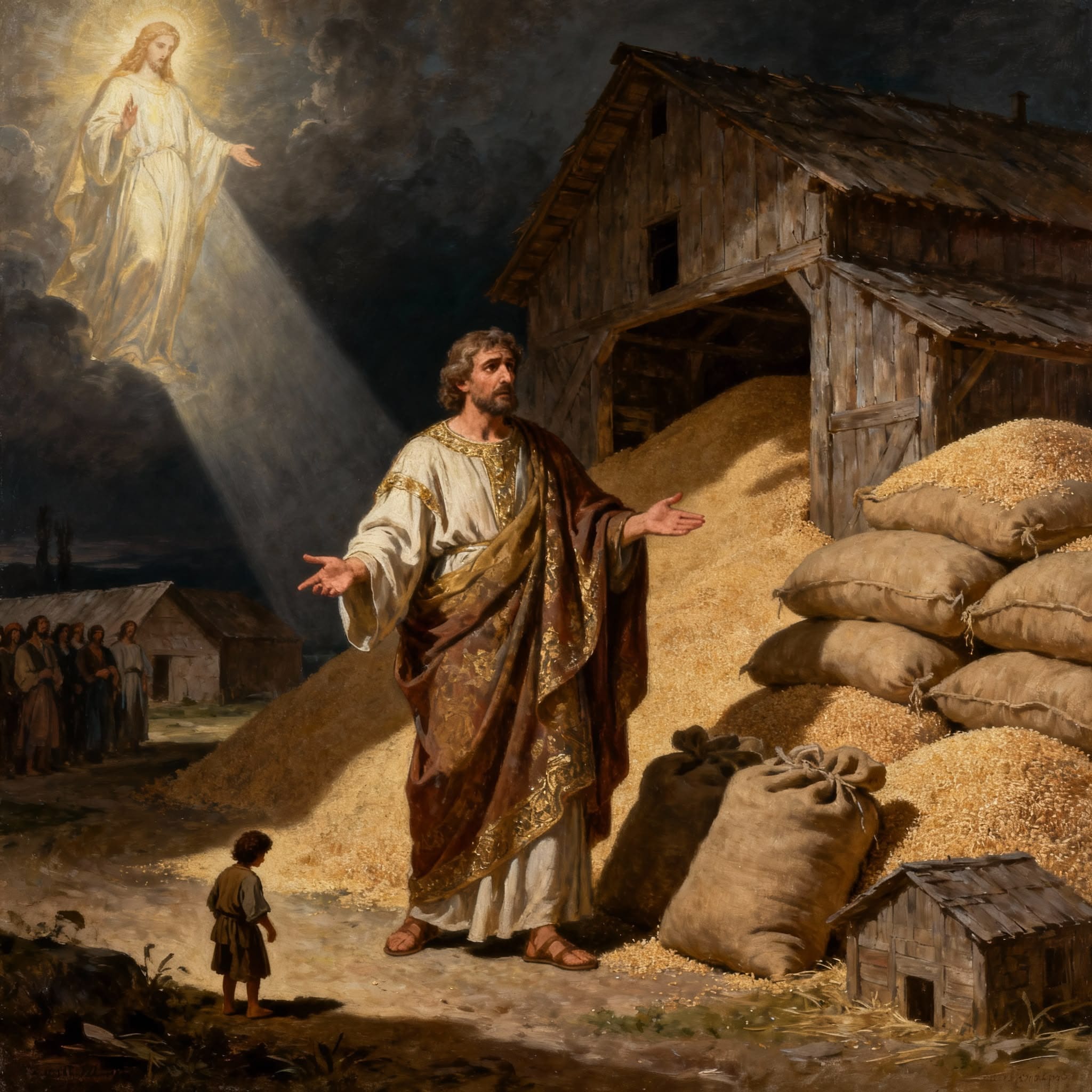Gospel of Jesus Christ according to Saint Luke
At that time,
Someone from the crowd asked Jesus,
“Master, tell my brother
to share our heritage with me."
Jesus answered him:
"Man, who established me
to be your judge or the arbiter of your shares?
Then, addressing everyone:
“Beware of all greed,
because someone's life,
even in abundance,
does not depend on what he owns.
And he told them this parable:
“There was a rich man,
whose estate had yielded well.
He wondered:
“What am I going to do?
For I have no place to put my harvest.”
Then he said to himself:
“Here is what I will do:
I will demolish my attics,
I will build bigger ones
and I will put all my grain and all my goods there.
Then I will say to myself:
So here you are with many goods at your disposal,
for many years.
Rest, eat, drink, enjoy life.”
But God said to him:
“You are crazy:
This very night, you will be asked for your life again.
And what you will have accumulated,
Who will have it?”
This is what happens to the one who hoards for himself,
instead of being rich toward God.
– Let us acclaim the Word of God.
Unmasking Greed to Choose True Wealth, Today
Read Lk 12:13-21 at the height of life to free the heart and guide our choices.
This article is aimed at readers who want to articulate faith, ethics, and daily life without moralism. Starting from the parable of the man in the barns (Luke 12:13-21) and the beatitude of the poor in spirit (Matt. 5:3), we explore a very concrete path: diagnosing the greed that disguises itself as prudence, reopening our trust in God, and building a personal economy of sufficiency. With practical benchmarks, echoes of tradition, a prayer with a liturgical tone, and an action sheet, this journey aims for an inner liberation that has repercussions on the family, work, and the community.
- Situate the text: a sharing of inheritance that has become revealing of a desire greater than possessions.
- Understanding the axis: life does not depend on what we have, but on Who carries us.
- Deploy three axes: unmask greed, become rich in God, taste poverty of heart.
- Take action: applications by sphere of life, guided practice, responses to current challenges.
Context
The story opens with a very human scene: in the middle of a crowd, someone calls on Jesus to arbitrate an inheritance dispute. Asking a recognized master to settle a patrimonial question is nothing unusual in the Jewish context of the first century. But Jesus refuses to pose as an arbiter of division. His refusal is not indifference; it is pedagogical. He shifts the issue: "Beware of all greed, for one's life, even in abundance, does not consist in the possessions he possesses." He unravels the symptom (the conflict over inheritance) to reach the root (the heart magnetized by possessions).
The following parable is about a landowner whose land has "produced well"The problem is not the fertility of the fields or the planning. The crux is the logic of closure: demolishing, expanding, storing, saying to oneself "rest, eat, drink, enjoy." There is neither "grace" nor "for" in his verbs. No recognition, no circulation, no address. Everything is withdrawal, self-sufficiency, self-conversation. At the heart of this soliloquy, God intervenes: "You are mad: this very night, your life will be demanded of you. And what you have accumulated, who will have it?" The question is not sarcasm; it is a mercy that opens our eyes. It illuminates the illusion of total control and reminds us that life is received. The verdict sums up: "This is what happens to the one who hoards for himself, instead of being rich in view of God."
The liturgy often places this passage with the beatitude: “Blessed are the poor in spirit, for theirs is the kingdom of heaven” (Mt 5:3). This connection is a solid hermeneutic thread. Poverty of heart is not misery endured; it is trusting availability, freedom from goods, anchored in the relationship with God and neighbor. It does not prohibit economic creativity or prudent management; it converts them into service. Thus, the axis that connects Lk 12 and Mt 5 is simple and incisive: shifting the security of having to being-with. In our societies of relative abundance as in regions of scarcity, this shift reconfigures priorities, the use of time, the way of working, consuming and investing.
Finally, the provocative question "Who will have it?" crosses the centuries and still falls today in our calendars, our banking applications, our career choices. It does not advocate improvidence; it calls for wisdom: what part of our decisions is informed by fear? What part is driven by active trust? Jesus does not evacuate this tension; he illuminates it.
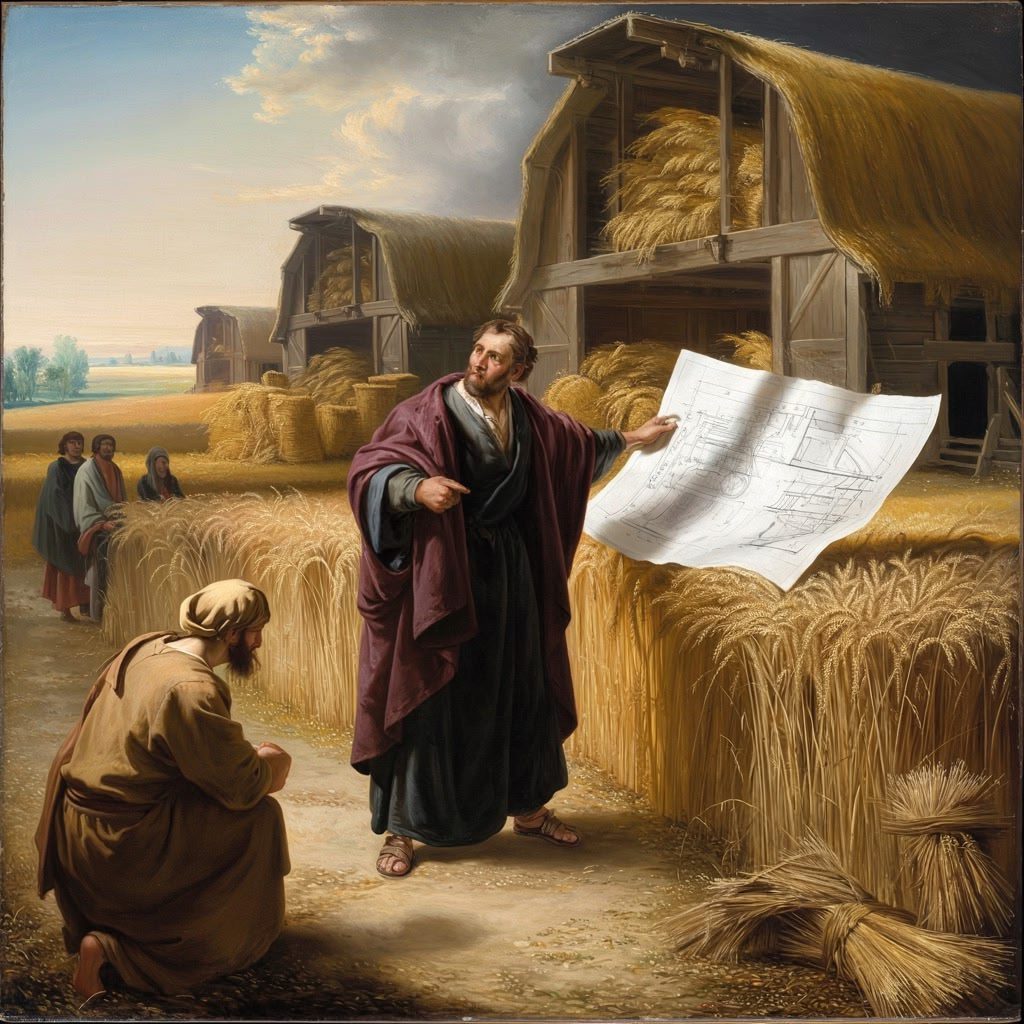
Analysis
Life does not depend on possession but on relationship. Evidence: the story points to three displacements.
From illusory control to received contingency. "This very night" is enough to put even the most solid plans into perspective. The issue is not the development of granaries, but their closed logic. Man plans without a horizon greater than himself.
The Word reintroduces otherness: God, others, uncontrollable time. Proof by contrast: the repeated "I" saturates the scene; no blessing is pronounced, no sharing envisaged.
From soliloquy to circulation. Abundance becomes sterile when it is confined. Spiritually, what does not circulate becomes corrupted. Socially, what is not shared breeds tension and inequality. Biblically, blessing is experienced when it passes from hand to hand.
The Alliance economy multiplies the loaves in the common pool, frees the manna from its rotting worm when one stops hoarding.
From greed to poverty of heart. Greed disguises itself as prudence, optimization, and "just security." Poverty of heart is not a vow of poverty; it is an inner skill: knowing when enough is enough, recognizing the origin and destination of good, and being open to giving.
Spiritual traditions converge on a diagnosis of greed as anxious attachment, and on a remedy that combines gratitude, simplicity, and justice toward one's neighbor.
Jesus does not oppose the economy and the Gospel; he hierarchizes them. Priority to the right relationship, to meaning, to service; subordination of economic means to these ends. Thus an art of living is emerging where one can undertake, save, transmit, but "with a view to God", that is to say with a view to good, communion, praise. It is a call to the transformation of the heart and of structures, one not holding without the other.
three trips to reread his week
- From control to trust: a decision where I over-steered instead of listening.
- From accumulation to circulation: a good that I can share.
- From greed to poverty of heart: an attachment I can offer to God.
Micro-examination at the end of the day to give economic choices some breathing room.
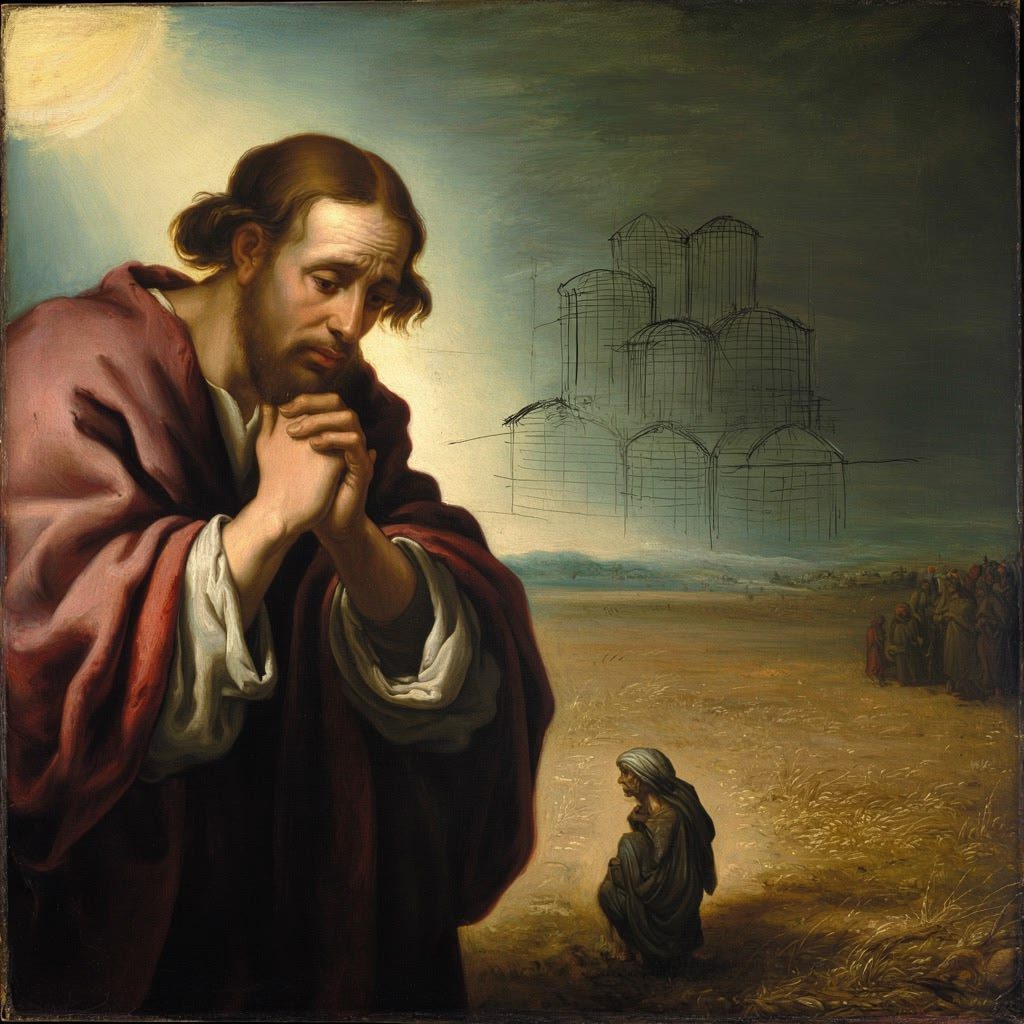
Unmasking Greed, Its Illusions and Promises
Greed is not primarily an amount; it is a dynamic of desire. It promises security, control, pleasure, recognition. It speaks the language of prudence but uses it as a mask. Three illusions are then reinforced.
Illusion of security: "When I have enough, I will finally be serene." But "enough" always recedes. Neuroscience highlights a phenomenon of habituation: pleasure diminishes, demand increases. Spiritually, security here merges with an anesthesia of anxiety. Jesus, by introducing "this very night," reinstates the truth of time: peace does not come from a stock, but from a presence.
Illusion of identity: "What I said is who I am." In social networks as at dinner parties, we tend to value ourselves through our acquisitions, our exploits, our vacation destinations. The man in the attic speaks to himself as if he were a trophy. But evangelical identity is received with a creative gaze: "You are my beloved child." When identity is given, possessions are reclassified; they become accessories, useful perhaps, vital sometimes, but never ultimate.
Illusion of control: "I control the future by expanding my granaries." Biblical realism is not fatalistic; it is lucid. We can prepare, insure, plan. But to believe that we neutralize vulnerability through quantity is to slide from prudence to magic. The parable breaks the magic: the demand for life escapes our contracts.
Behind these illusions, greed offers an inverted liturgy. It feeds on rituals: compulsively watching prices, accumulating comparisons, tracking "deals," measuring optimization "metrics." These gestures in themselves are not bad; but their frequency, their purpose, their influence speak of worship. The heart prostrates itself somewhere: either before the Giver, or before the stock.
What symptoms should you look out for? At the emotional level, chronic worry, mild jealousy, impatience when talking about sharing. At the cognitive level, the sophisticated rationalization of selfishness ("I'll do it later," "I've already given in other ways"). At the practical level, a deficit of explicit gratitude, the absence of "allocation" of surpluses, budgetary opacity.
How to unmask without feeling guilty? By adopting a gentle and consistent approach. First step: designate a "sufficiency threshold" for each major category (housing, food, mobility, leisure). Not to deprive yourself, but to liberate yourself. Second step: practice "first fruit": as soon as a surplus arrives, detach a portion and assign it to the common good. Third step: report to someone: friend, mentor, community. The light of others reduces the blind spot.
Finally, hearing God's question as an invitationn: "Who will have it?" This question opens up the imagination of transmission. Who, beyond my legal heirs, will benefit from what I manage? What cause, what institution, what person? By broadening the horizon, the treasure ceases to be a bunker and becomes a bridge.
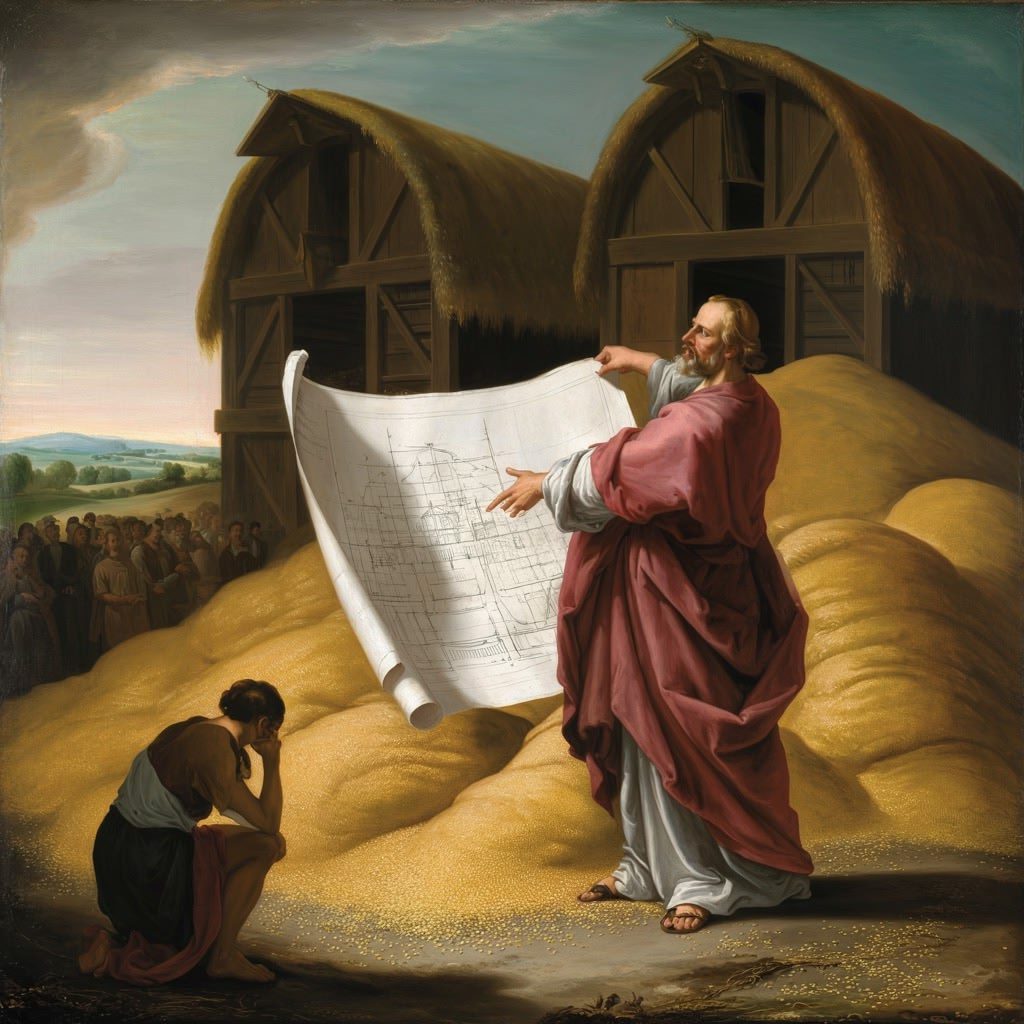
Becoming “rich toward God”: relationship, gratuity, service
The phrase "rich toward God" might be frightening.: we imagine a disembodied spirituality, or on the contrary a permanent guilt. In reality, it unfolds a triple dynamic.
Being rich in God means first of all inhabiting the relationship with the GiverConcretely, this means anchoring one's economic decisions in prayer and listening. Not to sanctify every purchase, but to integrate God into the choices that structure: career direction, place of living, use of time, commitments. This relationship is nourished by thanksgiving: blessing before a meal, giving thanks after a success, receiving a raise as a responsibility.
Free is not the negation of price; it is the introduction of another regime. It opens spaces where market logic does not dictate everything. Offering time without return, giving without recognition, forgiving a symbolic debt. These gestures reconfigure the social fabric and liberate the soul. They do not replace justice; they spread it.
Richness in God's sight is measured by the ability to serveIn business, this translates into leadership that seeks the good of teams, product quality, and social impact. In the family, it translates into attentive presence and educational choices that prioritize relationships over performance. In the community, it translates into a commitment that goes beyond mere indignation and moves toward construction.
How to develop this wealth? Through "liturgies of circulation." Establish regular meetings where we examine the use of goods: monthly for the budget, quarterly for donations, annual for transmission. Adopt a "rule of three Ps": Pray before major decisions; Share surpluses upon receipt; Plan a symbolic and material legacy in the service of a cause beyond ourselves.
Another powerful lever is competence. Becoming rich "in God's sight" involves training yourself to do good. Give poorly, and you can cause harm; give better, and you multiply your impact. Read about effective philanthropy, learn about association governance, and understand the tax and legal issues of inheritance. This technicality serves one purpose: that granaries become granaries for many.
Finally, joy ! We don't persevere in an ethic out of grimace but out of taste. Keep a gratitude journal, collect stories of impact, invite to our table people who embody this "richness in God." Joy nourishes constancy. It gently resolves internal resistances that, themselves, will stiffen if we force them.
Simple indicators of “wealth toward God”
- Share of surplus given in the year, decided in prayer and transparency.
- Number of hours donated to causes without compensation.
- Strategic decisions taken after community discernment.
- Gratitude Index: Two thanksgivings noted per day.
Four concrete benchmarks for managing your prosperity differently.

“Blessed are the poor in spirit”: freedom, desire, beatitude
The beatitude of the poor in spirit condenses the Gospel. It articulates three dimensions.
Freedom: poverty of heart is a freedom from possessions, acquired not through contempt for the world but through friendship with God. It dances with reality: it savors the beauty of a simple table, it appreciates a well-made tool, it rejoices in a shared success. But it does not allow itself to be possessed. A symptom of this freedom is the ability to renounce without bitterness, to postpone without frustration, to give without calculation.
Desire: poverty of heart does not kill desire; it straightens it out. It converts the hunger for "more" into a desire for "better": more meaning, more communion, more justice. It teaches us to read dissatisfaction as a call, not as a void to be filled. Desire is purified along the way, as we unmask the over-promises of greed and taste the fruits of a lighter life.
Bliss: “Happy” is not a slogan; it is a performative promise. This joy does not wait for ideal circumstances; it takes root. It is recognized by discreet markers: a peace that remains when the unexpected occurs, a gratitude that flourishes even in times of need, a benevolence that resists rivalry. Bliss does not eliminate hardship; it transfigures it.
Concretely, how can we move forward? Through pacts. A pact of simplicity: choosing a few select and joyful sacrifices to make room for what is essential. A pact of solidarity: tying a portion of one's income and time to a lasting cause. A pact of wisdom: surrounding one's decisions with people who dare to contradict oneself. These pacts structure the soul, like tutors for the vine.
Another path is gentle asceticism. Regular, unostentatious fasting frees encumbered desire. Sabbath lived unplugged puts being before doing. Lectio divina on these passages fuels discernment. This asceticism is not an exploit; it is hygiene of the soul. It prevents the slow slide toward greed that our environment fosters.
Finally, beatitude is embodied in a family and community cultureWe tell stories of generosity, we celebrate sharing, we establish rituals: a "surplus" box where children place a portion of their gifts, a "grace received" meal every quarter where everyone names a gift received and a gift passed on. Little by little, an ecosystem of poverty of heart makes greed less attractive.
Implications by sphere of life
Personal life:
- Establish a sufficiency budget: define thresholds by category and stick to them for three months.
- Keep a daily gratitude journal: two lines each evening, to shift the focus.
- Establish a weekly digital sabbath to reduce the pull of “always more.”
Family life:
- Establish a monthly “family council” to decide on donations and projects.
- Practice “first fruit” as a family: allocate a portion of income to a cause chosen together.
- Regularly tell stories of heroic and ordinary sharing.
Professional life:
- Anchor strategic choices in an explicit purpose serving the common good.
- Evaluate bonuses and incentives in light of internal equity and team health.
- Deploy transparency and responsible purchasing policies.
Community and civic life:
- Participate in local solidarity bodies; vote for an associative “budget of the heart”.
- Networking skills to serve the most vulnerable.
- Promoting happy sobriety in events and communication.
Financial and asset life:
- Formalize a charter for donations, savings, impact investing, and transmission.
- Choose investments aligned with ethical and ecological criteria.
- Legally prepare legacies for lasting works.
Digital life:
- Digital declutter: limit subscriptions, sort impulse purchases, turn off incentive notifications.
- Favor content that elevates desire: arts, reflection, testimonies.
- Follow a “given time vs scrolled time” indicator to correct the course.
3S rule for deciding
Simplicity: Does this choice bring me closer to a lighter life?
Solidarity: does this choice increase the share that circulates to others?
Wisdom: Does this choice remain true if “this very night” came?Three guiding questions before an important commitment.
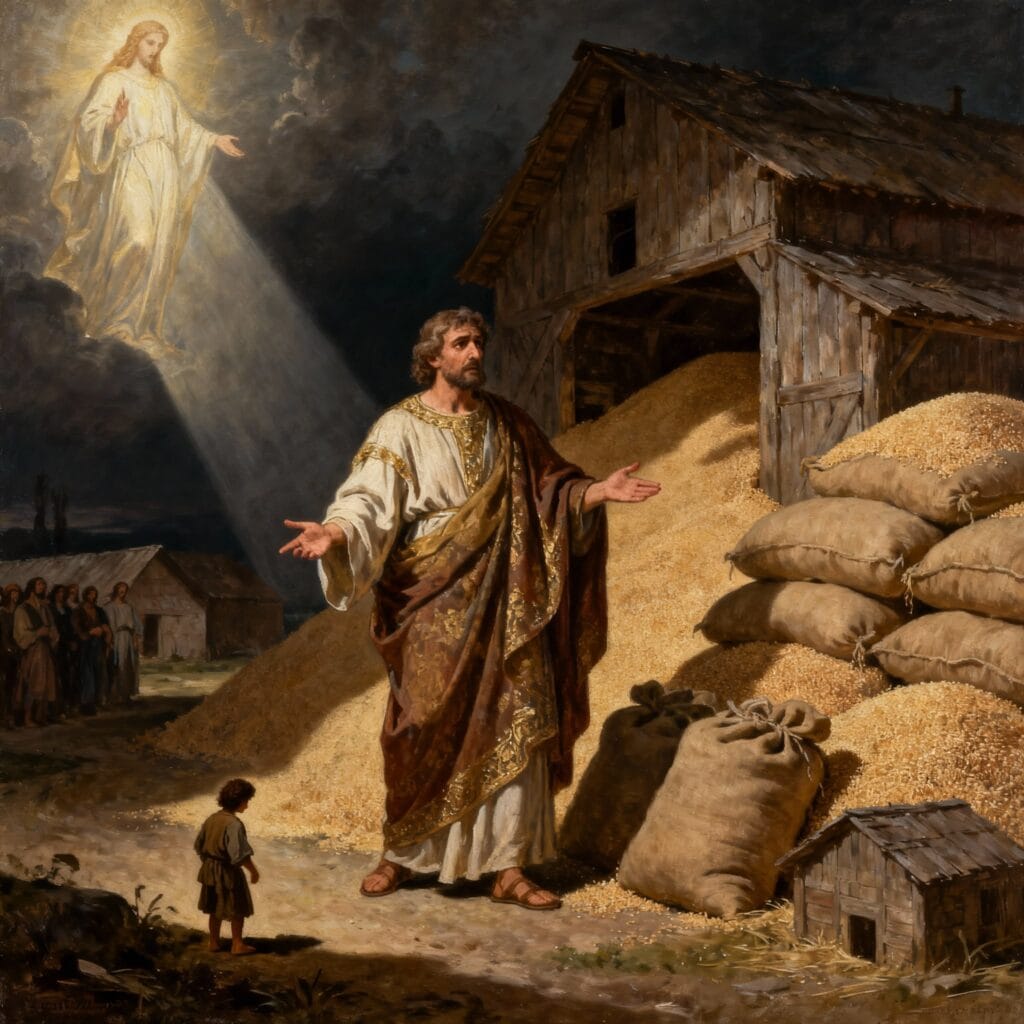
Christian tradition
The Christian tradition is very consistent on greed and poverty of heart. Basil of Caesarea comments on a similar text: "The granaries you want to build are the stomachs of the poor." He reminds us that private property exists, but that the surplus is not for oneself. John Chrysostom, in his homilies, constantly returns to the figure of the rich fool and to the drama of the rich man and Lazarus: he does not condemn wealth, but blindness and inaction. Augustine, a fine psychologist of desire, deploys the idea that the heart is created for God, and that it is "restless" as long as it closes in on finite goods.
Thomas Aquinas usefully distinguishes between (legitimate) “possession” and (ordered) “use.” Avarice becomes a vice when it disrupts use in relation to the end: the common good and happiness. In this perspective, poverty of heart is a virtue: it adjusts attachment and guides management.
Closer to us, Gaudium et Spes articulates human dignity, development and the universal destination of goods. Caritas in Veritate connects integral human development and charity in truth, emphasizing the role of gratuitousness in the economy. Laudato Si' adds a powerful call for joyful sobriety and an integral ecology that goes beyond the sum of gestures to touch the imagination.
These resonances are not weights, but lights. They confirm that the Gospel is not against economics; it is against idolatry. They provide tools: discernment, criteria, examples. They encourage boldness: inventing new forms of sharing, governance, and transmission. They invite a supernatural realism: you cannot change a system without converted hearts; you cannot maintain a conversion without supporting structures.
Guided meditation
Taste poverty of heart in a brief, weekly practice.
- Enter: Breathe three times. Say to yourself: “My life does not depend on what I own.”
- Reread: Name a time during the week when greed took over. Without judging yourself.
- Gratitude: List three gifts received. Let gratitude flow, even if modest.
- Sufficiency: write a concrete “enough” for the coming week (time, money, consumption).
- Circulation: decide on a specific, dated, realistic, joyful sharing gesture.
- Trust: Entrusting an economic concern to God, with his words. Asking for a grace of freedom.
- Take out: bless a nearby material good (tool, meal, clothing) and say: “May it be used for good.”
This practice becomes fruitful if it is part of a regularity: fifteen minutes each week, alone or as a couple, with a dedicated notebook. It does not require perfection; it requires truth. Little by little, the heart relaxes, the imagination opens, and joy visits.
Current issues
“Do we have to give up undertaking to be poor in spirit?” No. Entrepreneurship can be a wonderful way to be "rich in God" if the end guides the means. Keys: a clear purpose, responsible governance, a share of profits oriented toward the common good, a fair wage policy, and truly useful products.
“How to reconcile financial security and trust?” By a hierarchy. Build up reasonable precautionary savings, insure against major risks, plan for retirement. Then, beyond that, accept the logic of circulation: donations, impact investments, time offered. Security is not the abolition of risk; it is an inner peace, the fruit of combined prudence and trust.
“What if I am objectively in a precarious situation?” Poverty of heart is not a luxury of the privileged. It can be experienced in precariousness as a dignity: choosing gratitude, honoring one's commitments, asking for help without shame, and sharing a little of what one has (time, listening). On the other hand, justice requires societies to organize structural solidarity.
"In a context of massive inequality, are these calls not naive?" They would be naive if they limited themselves to individual gestures. But personal conversion and institutional reforms feed off each other. Voting, advocacy, professional commitment, investment choices, participation in intermediary bodies: all of this translates poverty of heart into a social project.
“What do you think about tax optimization and philanthropy?” Optimization becomes problematic when it violates fairness and the spirit of the law. Philanthropy, on the other hand, must avoid the window dressing effect and submit to evaluation. Criteria: transparency, governance, alignment with real needs, complementarity with justice and public policies.
“Does digital technology exacerbate greed?” Often. It leads to over-desire through repeated exposure, incessant comparisons, and one-click purchases. Concrete solutions: disable push notifications, impose reflection periods, track time and money metrics, and curate flows. Digital technology can also help circulation: facilitated donations, sharing communities, financial education.
“And the inheritance?” Preparing for one's estate is an act of love. It involves maintaining loyalty to loved ones, fairness between children, and openness to the common good. Ethical wills, foundations, and graduated donations are all tools to explore, with expert advice.
Prayer
God of life, you who give abundance and measure,
We bless you for the earth that bears fruit,
for the hands that work, for the bonds that keep us alive.
You who know our fears, our calculations, our overflowing attics,
purify our desires, enlarge our tents, open our hands.
Make us poor in spirit to receive your Kingdom.
Lord Jesus, you who said:
“Life does not depend on what you have,”
deliver us from the greed that constricts us,
teach us the joy of sufficiency,
grant that we may be rich toward God.
Holy Spirit, breath of wisdom and counsel,
come and inhabit our decisions, our budgets, our projects.
Inspire us with acts of generosity that heal,
give us eyes to see the needs,
courage to share, consistency to serve.
Remember the poor, the crushed debtors,
families in pain, entrepreneurs in struggle.
Remind the powerful of the universal destination of goods,
and to each the nobility of responsibility.
Let our houses become open attics,
that our businesses serve dignity,
that our cities learn joyful sobriety.
Father, into your hands we entrust what we have
and what we are. If "this very night" you call us,
find our lamps lit, our hearts light,
and our goods already on their way to others.
To you be glory, now and forever and ever. Amen.
Conclusion
The story of the granaries does not humiliate the intellect; it calls it to maturity. It does not despise economy; it converts it to its end.
By choosing poverty of heart, we do not lose: we gain in freedom, in clarity, in joy.
The steps proposed here are neither spectacular nor out of reach. They loosen the stranglehold, shift the center of gravity, and open up circulation.
Start small, persevere humbly, surround yourself simply: that's the method.
The question "Who will have it?" then becomes an answer: "A lot, and already, right now."
Let us enter into this movement; the Kingdom is not long in coming when hearts open.
Practical
- Set a personal sufficiency threshold per category this week and stick to it for thirty days.
- Open a “first fruit” account and pay into it a fixed percentage of any surplus received.
- Schedule a weekly twenty-four-hour digital sabbath without shopping or comparisons.
- Keep a gratitude journal with two daily entries, reviewed as a family every Sunday.
- Plan a quarterly donation to a valued cause and a monthly half-day of volunteering.
- Write a personal “riches for God” charter and share it with a peer.
- Prepare an annual wealth discernment meeting with an ethically aligned advisor.
References
- Gospel according to Saint Luke 12, 13-21; Gospel according to Saint Matthew 5, 3.
- Basil of Caesarea, Homilies on Avarice and Justice, notably "I will destroy my granaries."
- John Chrysostom, Homilies on the Gospel, “The Rich Man and Lazarus.”
- Augustine of Hippo, Confessions; Sermons on Goods and Charity.
- Thomas Aquinas, Summa Theologica, II-II, questions on avarice and almsgiving.
- Vatican II, Gaudium et Spes, Pastoral Constitution on the Church in the Modern World.
- Benedict XVI, Caritas in Veritate, encyclical on integral human development.
- Francis, Laudato Si', encyclical on the care of our common home.


